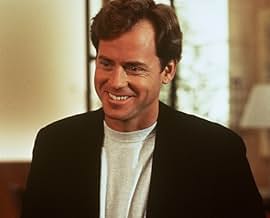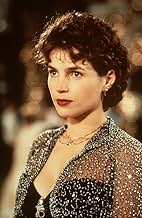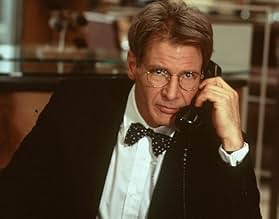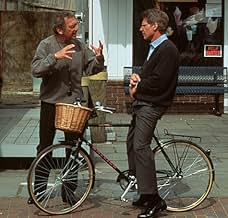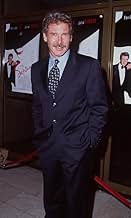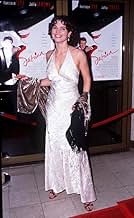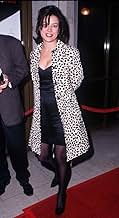AVALIAÇÃO DA IMDb
6,3/10
46 mil
SUA AVALIAÇÃO
Harrison Ford é Linus Larrabee, um magnata sem tempo para o amor. Quando um romance entre seu irmão playboy e Sabrina, filha do motorista da família, ameaça um dos negócios de Linus, ele rev... Ler tudoHarrison Ford é Linus Larrabee, um magnata sem tempo para o amor. Quando um romance entre seu irmão playboy e Sabrina, filha do motorista da família, ameaça um dos negócios de Linus, ele revê sua agenda.Harrison Ford é Linus Larrabee, um magnata sem tempo para o amor. Quando um romance entre seu irmão playboy e Sabrina, filha do motorista da família, ameaça um dos negócios de Linus, ele revê sua agenda.
- Direção
- Roteiristas
- Artistas
- Indicado a 2 Oscars
- 2 vitórias e 6 indicações no total
Avaliações em destaque
The temptation to compare it with the 1954 version is not small. And it is a good thing because the film has the force to use its voice. Julia Ormond is realy Sabrina. And Harrison Ford is a revelation as Linus. But, for me, the authetic good points are Miriam Colon as lovely Rosa and Nancy Marchand as wise,fascinating Maude Larrabee. Short, a seductive film.
Passable but overlong remake of the classic Audrey Hepburn vehicle will play best for those not familiar with the original. The cast(Harrison Ford, Julia Ormond, Greg Kinnear) performs well and its production values are high but director Sydney Pollack's pacing tends to flag. By contrast, Billy Wilder's direction of the 1954 version is much tighter and quicker. Interestingly this "Sabrina" is 15 minutes longer than its predecessor but thanks to Pollack those extra 15 minutes feel like 30. Also, Barbara Benedek's and David Rayfiel's script lacks the wittiness that scenarists Billy Wilder, Samuel Taylor("Vertigo") and Ernest Lehman("The Prize," "North by Northwest") provided the first time around.
Bottom line: 6 out 10.
Bottom line: 6 out 10.
I was surprised at how good this movie is. A remake of a movie starring Audrey Hepburn, Humphrey Bogart and William Holden, directed by one of the greats of American cinema, Billy Wilder, is not exactly the kind of task for the faint of heart. The fact that Sydney Pollack (They Shoot Horses Don't They? (1969), Tootsie (1982), Out of Africa (1985), etc.) decided to do it must have raised a few eyebrows in Hollywood land.
And let's just say I had preconceptions as I sat down to watch this. No way could this be anything near as good as the original. And for the first twenty minutes or so I was not dissuaded. Julia Ormond, who was given Miss Hepburn's title role, seemed nothing far removed from ordinary; and Greg Kinnear, who played the playboy David Larrabee, seemed a poor imitation of William Holden. Of course Harrison Ford, I told myself, is another story, since he is the embodiment of the fulfillment of the desire of many woman, and a fine, accomplished leading man. He would be, I suspected, the lone bright spot. In the original, Humphrey Bogart, a little past his prime, and in not exactly the best of moods, and not entirely pleased with the relatively inexperienced Audrey Hepburn, played the cool tycoon Linus Larrabee with some distracted forbearance in what many consider one of his lesser performances. Surely Harrison Ford could improve on that.
He did, but what really surprised me was just how diabolically clever the oh, so romantic script by Barbara Benedek and David Rayfiel turned out to be. I mean, Cinderella move over. Sabrina could not have achieved a more glorious existence had she died and gone to heaven. It is hard to imagine a more fulfilling fantasy for a chauffeur's daughter than what transpires here.
Quickly here's the premise of this celluloid fairy tale/romance: Pretty but ordinary Sabrina, born of working class parents, her father the chauffeur of the ultra rich Larrabees, grows up living above the garage in the palatial Larrabee estate. She watches the lavish parties thrown by the Larrabees from a spot in a tree and falls madly in the kind of puppy love that never goes away with the younger of the Larrabee brothers, David, who is the kind of guy who gives playboys a bad name. When she comes of age, she goes away to Paris (apparently to work for a fashion magazine: in the original Sabrina, she goes to a cooking school in Paris), picks up confidence and a new kind of eye-popping sophistication, comes back and...well, gets noticed.
The basic skeleton of this, the story from the first Sabrina (1954), which is dreamily romantic enough and then some, is greatly augmented here with some very fine psychological touches including developing Sabrina's character beyond the pretty and stylish to something bordering on the wise and heroic. Suffice it to say that we come away feeling she deserves every rainbow's end she gets. I can see Benedek and Rayfiel exclaiming with riotous joy as they are writing the script (trading e-mails perhaps): "They want romance, they want woman's fantasy? They want Sabrina to have a pot of gold and true love everlasting? How about riches beyond counting and the doting attention of the two handsome, very rich brothers? She can take her pick. We've give 'em romance, we'll give 'em dreams come true!" And they do. Not only that, but they keep us guessing about who gets the girl until the last possible moment, and they do that very cleverly.
Of course it helps to have professional direction by Sydney Pollack and a fine cast including Harrison Ford--at his best, by the way--and Julia Ormond, a hard-working and talented actress (I recall her from Smilla's Sense of Snow, 1997), who knows how to be cute without fawning, supported by Greg Kinnear, Nancy Marchand, John Wood and Angie Dickinson. I mention Miss Dickinson because, as the mother of a perspective bride about to throw an incredibly lavish wedding, she gets to deliver this "let them eat cake" line: "We thought we'd use recycled paper" (for the wedding invitations).
The script is full of similar witticisms, some verbal, some like eye candy. For example, when Sabrina removes her glasses (the usual Hollywood signal for the adolescent ugly duckling to become a beautiful swan) after gaining sophistication in Paris, she quotes aptly but surprisingly from Gertrude Stein: "America is my country and Paris is my home." (Of course Gertrude Stein never heard of Paris, Texas--but that is another film, and besides, I digress...)
I also liked it when Sabrina is in the arms of her Paris would-be lover who kisses her, and--noticing that she is not as engaged as she might me–observes with perfect decorum, "I'm embarrassed that you're somewhere else."
Memorable was the shot of Harrison Ford momentarily looking jealous and hurt. By the way, he has a number of good lines, and he delivers them well.
I especially liked it when he sadly confessed: "I was sent to deal with you. I sent myself."
It is probably better if you haven't seen the original and can experience this on its own merits without the odiousness that sometimes comes with comparisons. Comparing Audrey Hepburn with Julia Ormond is like comparing Grace Kelly with Jennifer Lopez. They really are very different people. And comparing Billy Wilder's 1954 film (from the play by Samuel Taylor) is a little like comparing Lon Chaney's Phantom of the Opera with Andrew Lloyd Webber's.
Bottom line: see this for both Harrison Ford who wears the business-first character of the "only surviving heart donor" very well, and for Julia Ormond whose intense and beguiling performance makes us forgive her for not being Audrey Hepburn.
(Note: Over 500 of my movie reviews are now available in my book "Cut to the Chaise Lounge or I Can't Believe I Swallowed the Remote!" Get it at Amazon!)
And let's just say I had preconceptions as I sat down to watch this. No way could this be anything near as good as the original. And for the first twenty minutes or so I was not dissuaded. Julia Ormond, who was given Miss Hepburn's title role, seemed nothing far removed from ordinary; and Greg Kinnear, who played the playboy David Larrabee, seemed a poor imitation of William Holden. Of course Harrison Ford, I told myself, is another story, since he is the embodiment of the fulfillment of the desire of many woman, and a fine, accomplished leading man. He would be, I suspected, the lone bright spot. In the original, Humphrey Bogart, a little past his prime, and in not exactly the best of moods, and not entirely pleased with the relatively inexperienced Audrey Hepburn, played the cool tycoon Linus Larrabee with some distracted forbearance in what many consider one of his lesser performances. Surely Harrison Ford could improve on that.
He did, but what really surprised me was just how diabolically clever the oh, so romantic script by Barbara Benedek and David Rayfiel turned out to be. I mean, Cinderella move over. Sabrina could not have achieved a more glorious existence had she died and gone to heaven. It is hard to imagine a more fulfilling fantasy for a chauffeur's daughter than what transpires here.
Quickly here's the premise of this celluloid fairy tale/romance: Pretty but ordinary Sabrina, born of working class parents, her father the chauffeur of the ultra rich Larrabees, grows up living above the garage in the palatial Larrabee estate. She watches the lavish parties thrown by the Larrabees from a spot in a tree and falls madly in the kind of puppy love that never goes away with the younger of the Larrabee brothers, David, who is the kind of guy who gives playboys a bad name. When she comes of age, she goes away to Paris (apparently to work for a fashion magazine: in the original Sabrina, she goes to a cooking school in Paris), picks up confidence and a new kind of eye-popping sophistication, comes back and...well, gets noticed.
The basic skeleton of this, the story from the first Sabrina (1954), which is dreamily romantic enough and then some, is greatly augmented here with some very fine psychological touches including developing Sabrina's character beyond the pretty and stylish to something bordering on the wise and heroic. Suffice it to say that we come away feeling she deserves every rainbow's end she gets. I can see Benedek and Rayfiel exclaiming with riotous joy as they are writing the script (trading e-mails perhaps): "They want romance, they want woman's fantasy? They want Sabrina to have a pot of gold and true love everlasting? How about riches beyond counting and the doting attention of the two handsome, very rich brothers? She can take her pick. We've give 'em romance, we'll give 'em dreams come true!" And they do. Not only that, but they keep us guessing about who gets the girl until the last possible moment, and they do that very cleverly.
Of course it helps to have professional direction by Sydney Pollack and a fine cast including Harrison Ford--at his best, by the way--and Julia Ormond, a hard-working and talented actress (I recall her from Smilla's Sense of Snow, 1997), who knows how to be cute without fawning, supported by Greg Kinnear, Nancy Marchand, John Wood and Angie Dickinson. I mention Miss Dickinson because, as the mother of a perspective bride about to throw an incredibly lavish wedding, she gets to deliver this "let them eat cake" line: "We thought we'd use recycled paper" (for the wedding invitations).
The script is full of similar witticisms, some verbal, some like eye candy. For example, when Sabrina removes her glasses (the usual Hollywood signal for the adolescent ugly duckling to become a beautiful swan) after gaining sophistication in Paris, she quotes aptly but surprisingly from Gertrude Stein: "America is my country and Paris is my home." (Of course Gertrude Stein never heard of Paris, Texas--but that is another film, and besides, I digress...)
I also liked it when Sabrina is in the arms of her Paris would-be lover who kisses her, and--noticing that she is not as engaged as she might me–observes with perfect decorum, "I'm embarrassed that you're somewhere else."
Memorable was the shot of Harrison Ford momentarily looking jealous and hurt. By the way, he has a number of good lines, and he delivers them well.
I especially liked it when he sadly confessed: "I was sent to deal with you. I sent myself."
It is probably better if you haven't seen the original and can experience this on its own merits without the odiousness that sometimes comes with comparisons. Comparing Audrey Hepburn with Julia Ormond is like comparing Grace Kelly with Jennifer Lopez. They really are very different people. And comparing Billy Wilder's 1954 film (from the play by Samuel Taylor) is a little like comparing Lon Chaney's Phantom of the Opera with Andrew Lloyd Webber's.
Bottom line: see this for both Harrison Ford who wears the business-first character of the "only surviving heart donor" very well, and for Julia Ormond whose intense and beguiling performance makes us forgive her for not being Audrey Hepburn.
(Note: Over 500 of my movie reviews are now available in my book "Cut to the Chaise Lounge or I Can't Believe I Swallowed the Remote!" Get it at Amazon!)
Romantic is the word for this movie. The story, the settings, everything adds up to romantic. And it's clean - no gratuitous sex scenes or foul language! A rarity for a 90s movie. This movie has a timeless quality to it, and part of the reason is the (again) extremely romantic score! Many critics panned this version of "Sabrina", unfairly comparing it to the original Audrey Hepburn "Sabrina". Nobody could ever compare to Audrey Hepburn, but Julia Ormond is a fine Sabrina in her own right. She makes the transition from awkward teen to glamorous woman with subtlety and grace. Greg Kinnear shows a natural flair for acting in his first major movie role.
Tempting though it may be to compare this film to the 1954 version, you will miss the point if you do. To understand the true magic of Sydney Pollack's masterpiece, read the Samuel A. Taylor play both films were based on. While I'm sure the play was a great evening out at the theater between martinis in the 1950s, it's somewhat incredible that two film versions so profoundly translated this lightweight romantic comedy, each in its own time.
In 1954, Billy Wilder used an incredible cast to entertain. No, Bogart should never have been cast. Cary Grant might have created the dynamic relationship with Audrey Hepburn we fortunately got to see later in Charade, but if Bogart had not been cast would the film hold its classic status? Hepburn transfixed an audience and brought to the world La Vie en Rose. William Holden is period eye candy, and the film will always be fun.
Forty years later, however, Pollack made an important film. Taylor's play is, after all, just a fairy tale, and this film fully realizes it. Ormond is enchanting. Kinnear ripens the always empty David. Fanny Ardant brings a french cinema quality to the film's Paris episodes. Marchand's "I didn't teach you this" culminates what may be one of the best written scenes in American film. You can watch this scene over and over and each time gain a better understanding of how great acting can define a relationship, this one between mother and son, for an audience.
But this film should have been called Linus. Harrison Ford's tour de force performance as the greater Larrabee fulfills Pollack's mission to tell a simple story of how a king is transformed by the love of a woman.
"It was a lie, then it was a dream."
In 1954, Billy Wilder used an incredible cast to entertain. No, Bogart should never have been cast. Cary Grant might have created the dynamic relationship with Audrey Hepburn we fortunately got to see later in Charade, but if Bogart had not been cast would the film hold its classic status? Hepburn transfixed an audience and brought to the world La Vie en Rose. William Holden is period eye candy, and the film will always be fun.
Forty years later, however, Pollack made an important film. Taylor's play is, after all, just a fairy tale, and this film fully realizes it. Ormond is enchanting. Kinnear ripens the always empty David. Fanny Ardant brings a french cinema quality to the film's Paris episodes. Marchand's "I didn't teach you this" culminates what may be one of the best written scenes in American film. You can watch this scene over and over and each time gain a better understanding of how great acting can define a relationship, this one between mother and son, for an audience.
But this film should have been called Linus. Harrison Ford's tour de force performance as the greater Larrabee fulfills Pollack's mission to tell a simple story of how a king is transformed by the love of a woman.
"It was a lie, then it was a dream."
Você sabia?
- CuriosidadesSydney Pollack initially turned down the chance to direct the remake, thinking the material too dated to work effectively in 1995. Once he agreed to take it on, Pollack made sure he had the approval of the original's director, Billy Wilder.
- Erros de gravaçãoLinus leaves the first party early because he needs to check on the Tokyo markets before they close. But Tokyo financial markets would close at 4:00 AM or 5:00 AM New York time. It is clearly not that late in the evening.
- ConexõesEdited into Sting: Moonlight (1995)
- Trilhas sonorasMoonlight
Music by John Williams
Lyrics by Alan Bergman and Marilyn Bergman
Performed by Michael Dees
Produced by John Williams
Principais escolhas
Faça login para avaliar e ver a lista de recomendações personalizadas
Detalhes
- Data de lançamento
- Países de origem
- Idiomas
- Também conhecido como
- Сабріна
- Locações de filme
- Salutation House, West Island, Glen Cove, Long Island, Nova Iorque, EUA(Larrabee mansion)
- Empresas de produção
- Consulte mais créditos da empresa na IMDbPro
Bilheteria
- Orçamento
- US$ 58.000.000 (estimativa)
- Faturamento bruto nos EUA e Canadá
- US$ 53.672.080
- Fim de semana de estreia nos EUA e Canadá
- US$ 5.563.259
- 17 de dez. de 1995
- Faturamento bruto mundial
- US$ 53.696.959
- Tempo de duração2 horas 7 minutos
- Cor
- Mixagem de som
- Proporção
- 1.85 : 1
Contribua para esta página
Sugerir uma alteração ou adicionar conteúdo ausente



